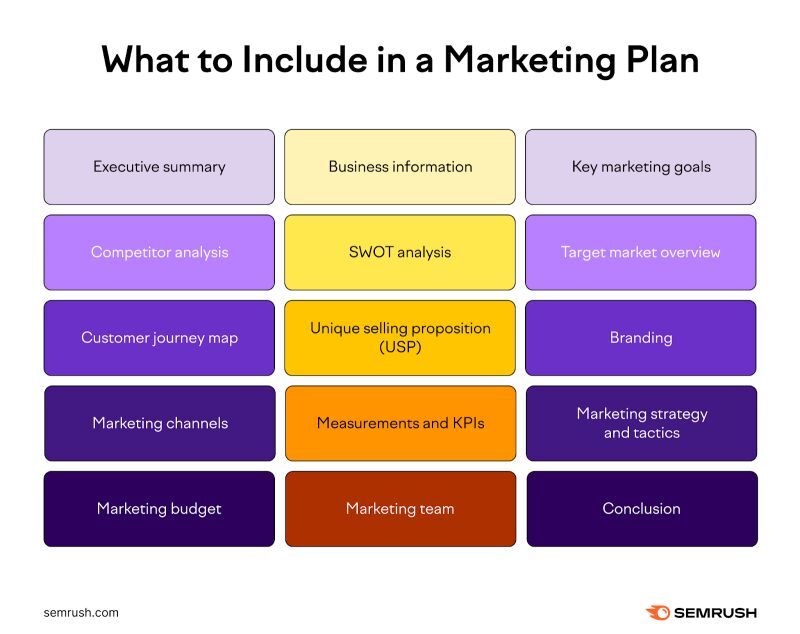What to Include in your Marketing Plan?
What to Include in your Marketing Plan?
In today’s business landscape, it’s vital to craft a comprehensive marketing plan to compete in the crowded market. A well-thought-out marketing plan serves as a roadmap, guiding your efforts and ensuring that your marketing activities are aligned with your business goals. Whether you’re a startup or an established company, here are key elements to include in your marketing plan:
- Executive Summary: Begin your executive summary by outlining key points such as objectives, target audience, main strategies, and expected outcomes.
- Set Clear Goals: Set SMART(Specific, Measurable, achievable, relevant, and time-bound) marketing goals aligned with your overall business objectives.
- Understand your audience: Define your target audience personas based on demographics, psychographics, behaviors, and their painpoints
- Analyze your competitors: Understand what your competitors are good at and where they’re lacking. This helps you find your edge and focus on what makes your business stand out.
- Define your Marketing Strategies and Tactics: Outline your overarching marketing strategies that suits to your business. It can be, content marketing, social media marketing, email marketing, SEO, paid advertising, etc.
- Plan Your Budget: Allocate a realistic budget for each marketing activity and channel. Make sure you’re spending your marketing money wisely where you can get high ROI.
- Identify key players: Decide who’s in charge of making your plan happen.
- Measure Your Performance: End your plan with how you’ll keep an eye on progress. Decide what you’ll measure, how you’ll do it, and how often.

A well-crafted marketing plan serves as a roadmap for achieving your business objectives and driving growth. By including these key elements in your marketing plan, you’ll be better equipped to navigate the ever-evolving marketing landscape and position your business for success.
A comprehensive marketing plan should include key elements to guide your marketing efforts effectively. Here’s a breakdown of what to include:
- Executive Summary
– Brief overview of your marketing goals and strategies.
– Concise summary of the entire marketing plan.
2. Mission Statement
– Define your company’s purpose and values.
– Align marketing goals with the overall mission.
3. SWOT Analysis
– Assess Strengths, Weaknesses, Opportunities, and Threats.
– Understand internal and external factors affecting your marketing.
4. Target Audience
– Clearly define your ideal customers.
– Identify demographics, interests, and pain points.
5. Marketing Goals
– Set specific, measurable, achievable, relevant, and time-bound (SMART) goals.
– Align goals with overall business objectives.
6. Marketing Strategies
– Outline the strategies you’ll use to achieve your goals.
– Include channels such as content marketing, social media, email, etc.
7. Budget and Resources
– Allocate funds for each marketing initiative.
– Specify human and technological resources needed.
8. Marketing Mix (4Ps)
– Product: Describe your products or services.
– Price: Set pricing strategies.
– Place: Determine distribution channels.
– Promotion: Outline promotional activities.
9. Timeline
– Create a timeline for implementing marketing strategies.
– Include milestones and deadlines.
10. Metrics and KPIs
– Define key performance indicators (KPIs) to measure success.
– Metrics may include website traffic, conversion rates, social media engagement, etc.
11. Monitoring and Adjusting
– Detail how you’ll monitor ongoing campaigns.
– Specify criteria for making adjustments based on performance.
12. Contingency Plans
– Anticipate potential challenges and risks.
– Develop contingency plans to address unforeseen issues.
13. Team Responsibilities
– Outline roles and responsibilities within the marketing team.
– Clarify who is responsible for each aspect of the plan.
14. Legal and Compliance
– Ensure all marketing activities comply with legal standards.
– Include considerations for data protection and privacy.
15. Conclusion
– Summarize the key points of the marketing plan.
– Reiterate overarching goals and strategies.
By incorporating these elements into your marketing plan, you create a comprehensive roadmap that guides your marketing efforts, ensures alignment with business objectives, and provides a framework for measurable success.

